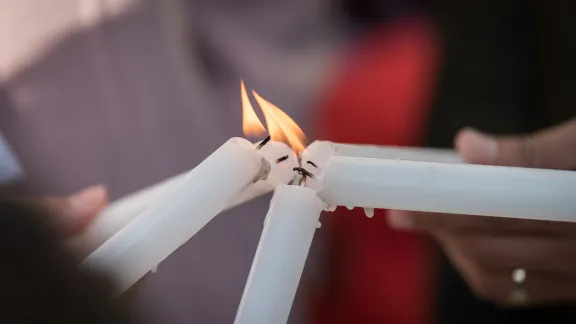
Lighting candles together. People of faith gather in a âPrayer for the Rainforestâ as part of the Cumbre Social por el Clima, on the fringes of COP25 in Madrid, Spain, where faith-based organizations urged decision-makers to take action for climate justice. Photo: LWF/Albin Hillert
Commitment to a responsible attitude towards our planet
(LWI) – As a member of the Global Prayer and Action Chain for Climate Justice, The Lutheran World Federation (LWF) hosted an online prayer service on 22 November. Faith actors and ecumenical partners encouraged participants to continue praying and acting for climate justice in the year before the upcoming COP26.
This weekend should have marked the end of the global climate conference COP26 in Glasgow, United Kingdom. Due to the Coronavirus disease (COVID-19) pandemic, the meeting was postponed to November 2021.
“The situation is critical,” said Elena Cedillo, LWFs Program Executive for Climate Justice. “The current COVID-19 crisis has shown that governments can act decisively in a crisis if they choose to do so. While less immediate for many, the climate crisis is not going away and without urgent action could cause catastrophic harms.”
Commitment to a responsible attitude
During the service, it became clear that these harms are already affecting many countries across the globe. Rev. Gilberto Quesada Mora, president of the Lutheran Costa Rican Church, pointed to the devastation caused by the hurricanes Eta and Iota in the Central American countries, particularly Nicaragua, Honduras, Guatemala, and El Salvador. “We pray for the lives lost, the livestock killed, and the crops destroyed,” he said. Quesada said we “need to reverse the devastating history” caused by human activity. He went on to say that “our Prayer unites and generates real changes in our contexts.”
“With our brothers and sisters in Costa Rica, we join the LWF in its commitment to a responsible attitude towards our Mother Earth. We pray that the governments in power may join the necessary efforts so that the most affected people and the most affected regions may have the necessary resources to restore their lives.”
Quesada sees the church's role to “do justice” to the planet through “our liturgies, our Biblical interpretation, and our theologies.” As “sons and daughters of reform”, it has to speak up on the urgency “to give back the planet to life.”
Weeping on a Polynesian beach
Anglican priest Jacynthia Murphy from Auckland, New Zealand, shared the “current and lived experience of the climate changes that are already happening here.” The projected impacts over the 21st century and beyond are enormous in scope, scale, and cost. The need to act is urgent “to prevent further disastrous consequences, especially on the islands of the Pacific.”
Not exempting New Zealand, itself, Murphy said: “The nations of the world have made some progress to tackling climate change. But of much deeper concern is the inability of many of them to adequately progress their commitments to something more binding.” By 2050, New Zealand is striving for zero carbon emission to reduce the country's climate impact.
With a personal story from 2014, Murphy recounted a church service on the beach of a Polynesian island. What looked like paradise, at first sight, turned out to be a beach lined with dying palm trees. “This devastation is caused by the rising salination in the life-giving freshwater that once ran through the aquifers underfoot.”
The family that once lived there for generations is now forced to carry in freshwater from the mainland or, worse, “abandon their beloved island as the sea walls they had built – and rebuilt – are unable to hold the increased sea-level rise.” Also, the agriculture that once sustained them is no longer possible. “We wept,” Murphy summarized the deep sentiments of the group of worshippers.
The Anglican Diocese of Polynesia is “stepping up efforts to encourage, share, and coordinate an ever-growing role in society's drive for sustainability.”
“The spirit of God is our greatest gift to society and ourselves,” Murphy said. “Our faith, theology, and liturgy speak powerfully to our relationship with and responsibility to God’s creation, which is our very life-support system.”
The prayer service began with a word of greeting from Glasgow Cathedral by Rev. Mark Johnstone, and included voices from men, women, and youth of many more countries: Lebanon, India, El Salvador, Hungary, Kenia, Sweden, USA, and Zambia. On behalf of the LWF, Edwin Abrego from the Salvadoran Lutheran Church and Kelly Sherman-Conroy from the Evangelical Lutheran Church in America contributed.
Ecumenical partners and Christian environmental and development agencies in Europe and the United Kingdom had jointly prepared the prayer service. They are the World Council of Churches (WCC), ACT Alliance, Anglican Communion Environmental Network (ACEN), European Christian Environmental Network (ECEN), Christian Aid, Tearfund, and Catholic Agency for Overseas Development (CAFOD).


